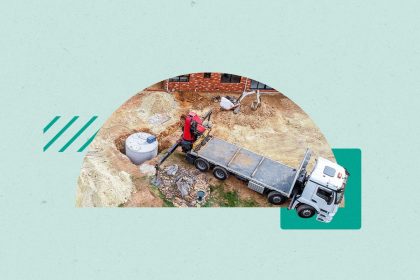For many, debt feels like a dead end. But for Charly Stoever, it’s been a bridge to freedom.
Stoever is a trans, nonbinary former stockbroker turned money coach who helps first-gen queer folks take up space and build wealth on their own terms. And they practice what they teach.
By carefully choosing business credit cards and leveraging the debt wisely, weighing both emotional and financial returns and committing to a lifestyle that aligns with their values, Stoever has grown a coaching business without sacrificing their well-being.
Their story isn’t just about financial strategy — it’s about redefining security, reclaiming agency and rejecting shame. In a world where debt is often framed as a failure, Stoever sees it as a lifeline for those shut out of traditional paths to wealth.
Lifestyle design as financial strategy
When Stoever began building their business, they made a conscious decision to keep their living expenses low. Rather than committing to long-term housing in one place, they embraced a gig that supported their financial goals, mental health and love of travel: house and pet sitting.
“I get bored easily, and realized I wasn’t ready to settle down,” Stoever says. “I love traveling, and since I’m not tied down to any city as a single person, it made sense not to pay tens of thousands in rent.”
Pet setting became a practical strategy that aligned with both their values and their business needs. It allowed them to work from peaceful, stable environments across Mexico, Thailand, the U.S. and now Europe — all while reducing their monthly costs during the early stages of entrepreneurship.
“It also helps my mental health,” they add. “Having pets around keeps me from feeling isolated when traveling alone. I’m happier when I’m pet-sitting versus staying alone in an Airbnb.”
This lifestyle supports both their well-being and their work. Travel keeps them curious, pets keep them grounded and lower expenses create more room for rest, creativity and intentional growth.
For Stoever, financial security means having the flexibility to live in ways that feel joyful, aligned with their values and sustainable.
Redefining debt as a tool for liberation
“I was taught that debt was evil — the devil, even,” Stoever says. “If you were in debt, it meant you were a bad, irresponsible, and frivolous person.”
But as a queer, nonbinary first-gen wealth builder, Stoever found that traditional financial advice often lacked context. “That belief framed debt as a moral issue — even though, as I later realized, millionaires and billionaires use debt every day.”
Most personal finance advice doesn’t account for systemic barriers like job discrimination, transphobia or the expectation to support extended family without generational wealth. For many, paying cash upfront for every major cost isn’t realistic — or strategic.
Stoever’s perspective shifted as they started their business. “I paid for my first business coaching program by selling $3,000 of Tesla stock and paying upfront,” they say. “But then I started learning how other business owners were using business credit cards opened under their business tax IDs — to protect their personal credit and to finance business coaching programs that easily cost five figures.”
Even though they’d never carried personal credit card debt, Stoever chose to trust themselves. “I reminded myself, ‘I trust myself to pay this off.’ And I made sure to have enough cash on the side so I could pay myself each month. That way, I wouldn’t end up resenting my business or giving up.”
Debt became a tool — not a burden. For Stoever, it’s a form of startup capital that makes growth possible when safety nets are limited or nonexistent.
Strategic uses of debt in business
When Stoever invested $9,000 in a business coaching program, they made a deliberate choice to use debt and to make it worthwhile. “I told myself that if I could make the investment back within the six-month program, it would be worth it. And it was. I made $40,000 in sales during that time.”
Stoever uses 0 percent APR offers and interest-free plans to preserve cash flow.
If interest is involved, I use debt calculators to compare the cost of interest over time versus paying upfront. I always calculate and weigh my options.
— Charly Stoever, Money coach
Stoever’s strategy centers on three key practices.
- Run the numbers: Use debt calculators to estimate total cost over time.
- Assess the return: Consider both financial and emotional ROI.
- Play the payoff: Align repayment with income and capacity.
“I’ve started seeing money spent not just in terms of financial return but emotional return,” Stoever says. That mindset shift — combined with journaling and nervous system care, like pausing to breathe or stretch before making big decisions — helps them borrow with clarity and confidence.
Advice for other first-gen, queer and trans entrepreneurs
If you’re a queer or trans entrepreneur trying to grow your business, Stoever wants you to know that you don’t have to do it alone, and you don’t have to burn out to succeed.
If you’re unsure whether borrowing is the right move, Stoever offers three points to consider.
- Borrow when it helps you grow: Debt can open access to coaching, tools or resources that increase your income or reduce stress.
- Set your own success metrics: Define financial security for yourself — whether that’s traveling, resting more or being able to leave unsafe environments.
- Lean on your community: Surround yourself with people who share your values and can support your growth.
For Stoever, financial security means the ability to choose peace. “Right now, financial security looks like exactly what I’m doing: I left the U.S. after the election for a fully self-funded three-month ‘semester abroad’ in Europe.”
They’ve prioritized sleep, stay in supportive housing and invested in their well-being, all while continuing to coach clients.
“Financial security is about freedom — being able to leave toxic environments and live where your dignity and rights are respected. I want to keep building toward that freedom and show others that it’s possible.”
Read the full article here





